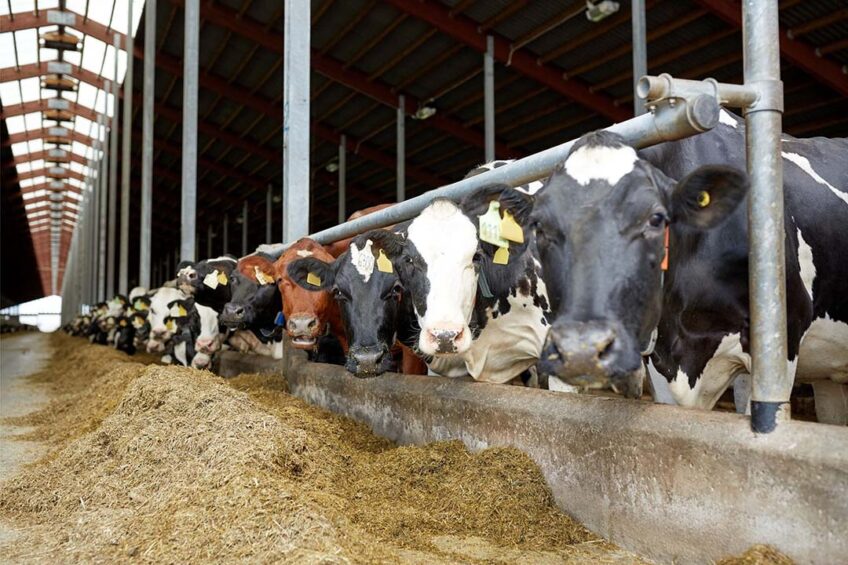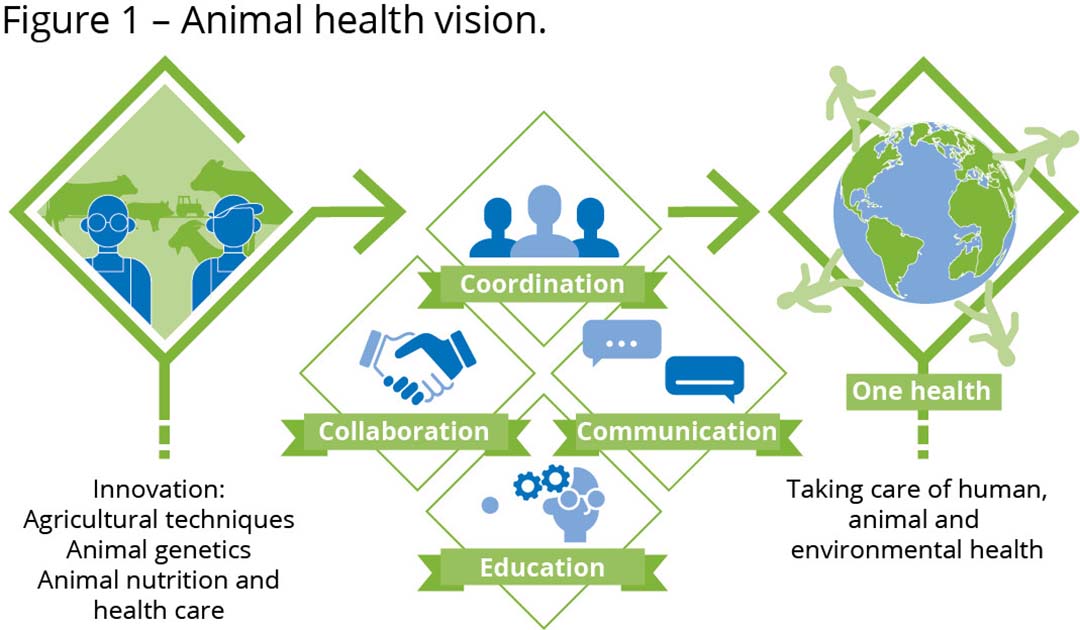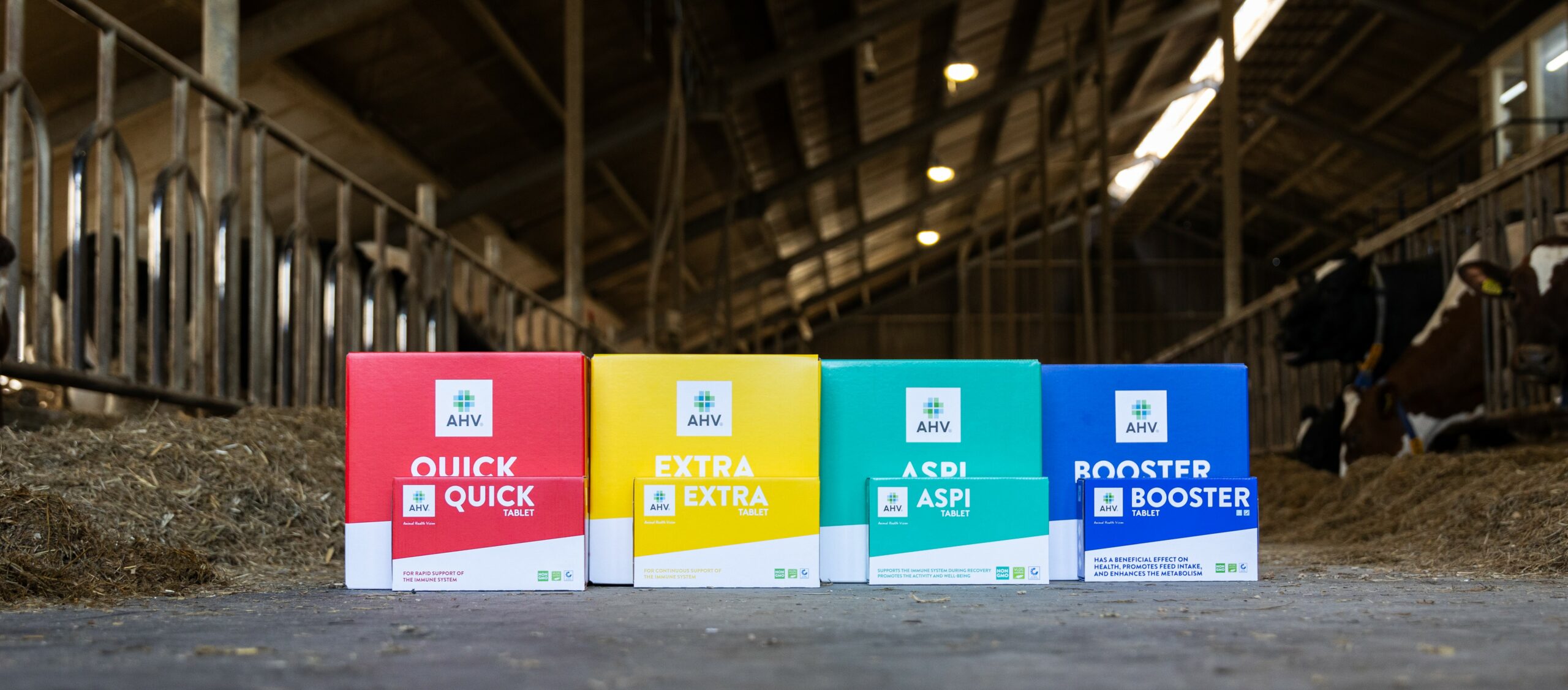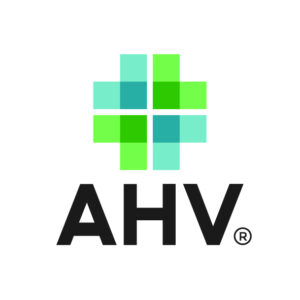Sustainably improving animal health

A crucial goal under the One Planet – One Health initiative is to ensure the careful and limited application of antibiotics in livestock farming to address the worldwide issue of antimicrobial resistance. The continuous use of antibiotics in large livestock operations endangers treatment efficiency by promoting the emergence and selection of antibiotic-resistant bacterial strains and their excretion into the environment.
Discharge of active antimicrobial agents through manure and agricultural drainage into the environment exacerbates the overall distribution of antibiotic-resistant pathogens (see Figure 1).
 AHV (Animal Health Vision) focuses on developing and marketing products based on herbal blend extracts for complementary feed and functional feed ingredients. The products improve animal health in multiple stress situations occurring in the natural life cycle of an animal. In dairy cows such stress moments include drying off, calving, and the transition period. Preventing such physiological and metabolic stress situations in turn reduces the risk of subclinical mastitis and other inflammatory disorders, such as laminitis and endometritis. A key element in the design of AHV products is testing individual ingredients and mixtures for their capacity to modulate bacterial quorum sensing and biofilm formation.
AHV (Animal Health Vision) focuses on developing and marketing products based on herbal blend extracts for complementary feed and functional feed ingredients. The products improve animal health in multiple stress situations occurring in the natural life cycle of an animal. In dairy cows such stress moments include drying off, calving, and the transition period. Preventing such physiological and metabolic stress situations in turn reduces the risk of subclinical mastitis and other inflammatory disorders, such as laminitis and endometritis. A key element in the design of AHV products is testing individual ingredients and mixtures for their capacity to modulate bacterial quorum sensing and biofilm formation.Various data processing steps and models are applied to demonstrate the efficacy of AHV products. This improves the accuracy of the model deployed by using statistical significance techniques, such as the Welch and T tests, Furthermore, this helps determine whether the observed differences between groups or conditions are statistically significant. These techniques assist in evaluating the reliability and applicability of the data analysis, and ultimately in assessing the effect of AHV products.

From individual data to population-based models
In line with AHV’s mission statement: promoting animal health and well-being while fostering sustainability in dairy farms, AHV has devised statistical tools and models. These tools facilitate replicating outcomes observed in individual farms implementing the AHV concept, as well as in the broader dairy population within specific countries, such as the Netherlands. The models employed for this purpose include gradient boosting and statistical significance techniques such as the Welch and T tests.
Gradient boosting (GBS) is a machine learning method that sequentially constructs multiple decision trees for classification and regression tasks. Each tree corrects errors from the previous one, enhancing the model’s accuracy. Statistical significance techniques like the Welch and T tests evaluate whether observed differences between groups or conditions are statistically meaningful, aiding in the assessment of data analysis results’ reliability and applicability.
[1] Herrema, F., Bieleman, H., Hoekstra, M. and Gomes, J., 2023. Longevity and Milk Production Improvement in Dairy Cows Using Plant-Derived Products. J Vet Heal Sci, 4(3), pp.128-140.
[2] Streefland, G.J., Herrema, F. and Martini, M., 2023. A Gradient Boosting model to predict the milk production. Smart Agricultural Technology, 6, p.100302.
AHV Results
The results presented in this table can be summarised as follows:
1. Longevity – In this study a comparison was made for two cases, AHV vs NON-AHV treated animals. A total of 64,467 animals were part of the study. Significant differences were observed between these two groups, with an exceptionally low p-value (orders of magnitude lower than p ≤ 0.001). For dairy farmers, this implies that cows treated with AHV products extended the mean culling age by 0.71 years compared to cows that did not receive AHV products. The increase in longevity is an indicator of improved animal health and welfare, providing substantial economic benefits for the farmer.
2. Milk yield – To determine the relationship between somatic cell count (SCC) and ISK (milk yield), a spearman-rank correlation coefficient test was performed. Again, the overall objective was to compare AHV treated animals with non-AHV treated reference animals. A somatic cell count exceeding 200,000 cells/mL was considered as an indicator for mastitis. Results show a statistically significant difference with a p-value of less than 0.05. The AHV group demonstrated a smaller reduction in milk yield as cell count increased, indicating a weaker correlation between cell count and milk production in the group and a higher resilience to subclinical mastitis.
3. Milk prediction – The machine learning algorithm GBS was applied in an attempt to predict milk yields for 3 different dairy companies. While the gradient boosting technique applied is not compatible with a test for statistical significance, the results demonstrate that the GBS model was making highly accurate predictions. In the validation set, the largest error in milk yield prediction was less than 2.5%. The model showed that the on-farm use of AHV products such as Quick and Extra improved the milk yield on all three farms included in this first trial.
Summary
AHV develops natural herbal remedies aimed at enhancing animal health and productivity, subsequently decreasing antibiotic use on farms. To illustrate the positive health impact, sophisticated statistical models were employed to compare data from large animal populations. The continuous use of antibiotics in large livestock operations endangers treatment efficiency by promoting the emergence and selection of antibiotic-resistant bacterial strains and their excretion into the environment.


